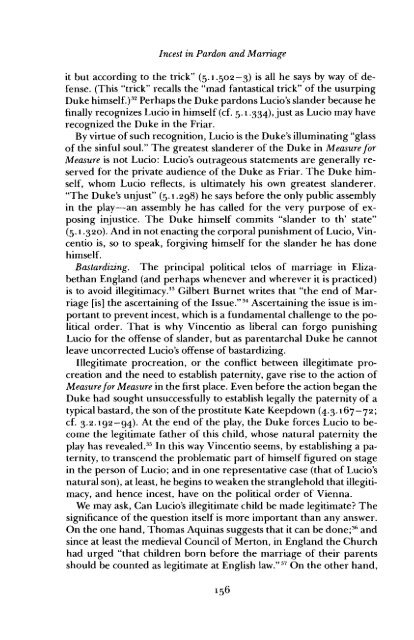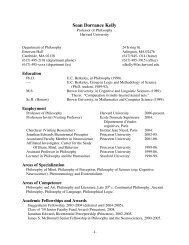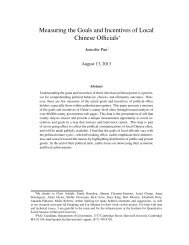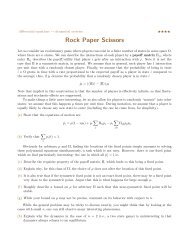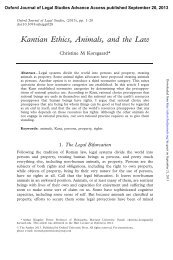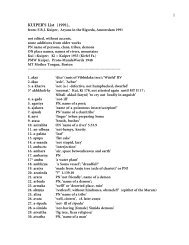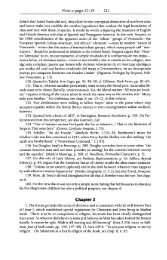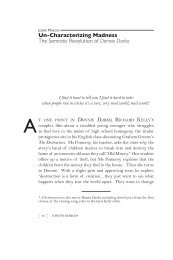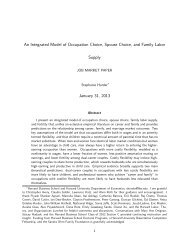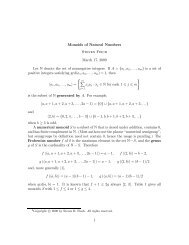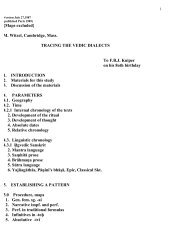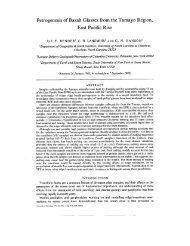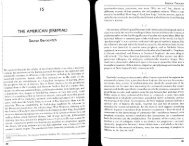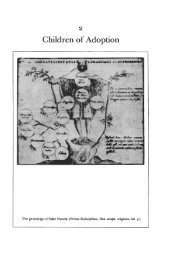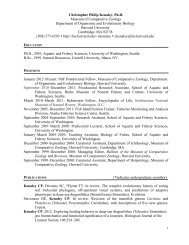Incest in Pardon and Marriage - People Fas Harvard
Incest in Pardon and Marriage - People Fas Harvard
Incest in Pardon and Marriage - People Fas Harvard
You also want an ePaper? Increase the reach of your titles
YUMPU automatically turns print PDFs into web optimized ePapers that Google loves.
<strong>Incest</strong> <strong>in</strong> <strong>Pardon</strong> <strong>and</strong> <strong>Marriage</strong><br />
it but accord<strong>in</strong>g to the trick" (5.1.502-3) is all he says by way of defense.<br />
(This "trick" recalls the "mad fantastical trick" of the usurp<strong>in</strong>g<br />
Duke him~elf.)~' Perhaps the Duke pardons Lucio's sl<strong>and</strong>er because he<br />
f<strong>in</strong>ally recognizes Lucio <strong>in</strong> himself (cf. 5.1.334), just as Lucio may have<br />
recognized the Duke <strong>in</strong> the Friar.<br />
By virtue of such recognition, Lucio is the Duke's illum<strong>in</strong>at<strong>in</strong>g "glass<br />
of the s<strong>in</strong>ful soul." The greatest sl<strong>and</strong>erer of the Duke <strong>in</strong> Measure for<br />
Measure is not Lucio: Lucio's outrageous statements are generally reserved<br />
for the private audience of the Duke as Friar. The Duke himself,<br />
whom Lucio reflects, is ultimately his own greatest sl<strong>and</strong>erer.<br />
"The Duke's unjust" (5. I .298) he says before the only public assembly<br />
<strong>in</strong> the play-an assembly he has called for the very purpose of expos<strong>in</strong>g<br />
<strong>in</strong>justice. The Duke himself commits "sl<strong>and</strong>er to th' state"<br />
(5. I .320). And <strong>in</strong> not enact<strong>in</strong>g the corporal punishment of Lucio, V<strong>in</strong>centio<br />
is, so to speak, forgiv<strong>in</strong>g himself for the sl<strong>and</strong>er he has done<br />
himself.<br />
Bastardiz<strong>in</strong>g. The pr<strong>in</strong>cipal political telos of marriage <strong>in</strong> Elizabethan<br />
Engl<strong>and</strong> (<strong>and</strong> perhaps whenever <strong>and</strong> wherever it is practiced)<br />
is to avoid illegitima~y.~~ Gilbert Burnet writes that "the end of <strong>Marriage</strong><br />
[is] the ascerta<strong>in</strong><strong>in</strong>g of the Issue."34 Ascerta<strong>in</strong><strong>in</strong>g the issue is important<br />
to prevent <strong>in</strong>cest, which is a fundamental challenge to the political<br />
order. That is why V<strong>in</strong>centio as liberal can forgo punish<strong>in</strong>g<br />
Lucio for the offense of sl<strong>and</strong>er, but as parentarchal Duke he cannot<br />
leave uncorrected Lucio's offense of bastardiz<strong>in</strong>g.<br />
Illegitimate procreation, or the conflict between illegitimate procreation<br />
<strong>and</strong> the need to establish paternity, gave rise to the action of<br />
Measure for Measure <strong>in</strong> the first place. Even before the action began the<br />
Duke had sought unsuccessfully to establish legally the paternity of a<br />
typical bastard, the son of the prostitute Kate Keepdown (4.3.167-72;<br />
cf. 3.2.192-94) At the end of the play, the Duke forces Lucio to become<br />
the legitimate father of this child, whose natural paternity the<br />
play has revealed.35 In this way V<strong>in</strong>centio seems, by establish<strong>in</strong>g a paternity,<br />
to transcend the problematic part of himself figured on stage<br />
<strong>in</strong> the person of Lucio; <strong>and</strong> <strong>in</strong> one representative case (that of Lucio's<br />
natural son), at least, he beg<strong>in</strong>s to weaken the stranglehold that illegitimacy,<br />
<strong>and</strong> hence <strong>in</strong>cest, have on the political order of Vienna.<br />
We may ask, Can Lucio's illegitimate child be made legitimate? The<br />
significance of the question itself is more important than any answer.<br />
On the one h<strong>and</strong>, Thomas Aqu<strong>in</strong>as suggests that it can be done;36 <strong>and</strong><br />
s<strong>in</strong>ce at least the medieval Council of Merton, <strong>in</strong> Engl<strong>and</strong> the Church<br />
had urged "that children born before the marriage of their parents<br />
should be counted as legitimate at English law."37 On the other h<strong>and</strong>,


